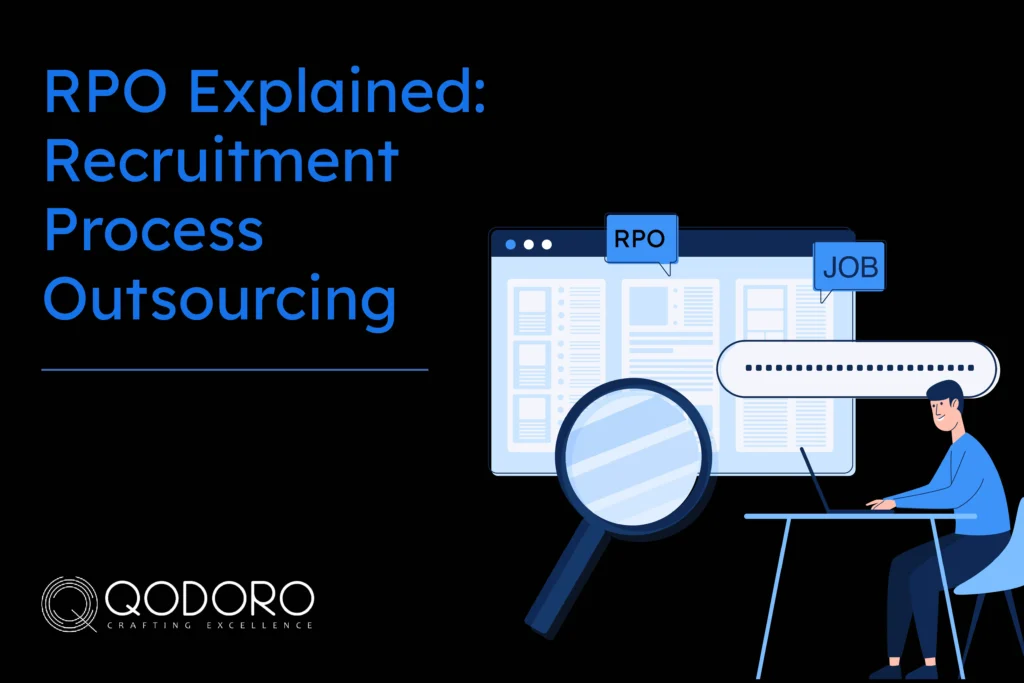
Published on: 02/07/2025

SHARE
Hiring the right talent has always been one of the biggest challenges for businesses. And in 2025, this challenge has only intensified. With hybrid work becoming the norm, global talent pools opening up, and the pressure to scale fast, companies are rethinking how they hire. That’s where Recruitment Process Outsourcing (RPO) steps in as a game-changer.
If you’ve been wondering “What is RPO recruitment process outsourcing?”, or whether it’s time to rethink your hiring strategy, this guide is for you. Let’s dive in.
Recruitment Process Outsourcing (RPO) is a strategic hiring model where a company transfers all or part of its recruitment processes to an external service provider. These providers called RPO providers act as an extension of your internal HR or talent acquisition team.
Unlike traditional staffing agencies that focus on filling individual roles quickly, RPO partners are embedded within your company culture, systems, and hiring goals. They offer end-to-end recruitment support including sourcing, screening, interviewing, onboarding, and even employer branding.
In 2025, RPO has evolved from being just a cost-cutting measure to a strategic talent acquisition solution that brings agility, innovation, and scalability to hiring.
The recruitment process under an RPO model may look similar to in-house hiring on the surface, but it is supported by deep recruitment expertise, sophisticated tools, and a data-driven approach.
Here’s how a typical RPO engagement works:
The RPO provider starts by understanding your business needs, culture, hiring challenges, and goals. Together, you align on what success looks like time-to-fill, cost-per-hire, candidate quality, etc.
Based on your needs, a customized recruitment workflow is created. This includes defining job roles, sourcing channels, screening processes, interview formats, and onboarding flows.
RPO providers often bring in advanced tools and platforms like AI-driven sourcing, applicant tracking systems (ATS), and recruitment analytics dashboards. These tools can integrate with your existing HR tech stack or replace outdated systems.
Using targeted strategies and databases, RPO recruiters reach out to active and passive candidates. They manage job postings, talent marketing, and candidate engagement across multiple platforms.
Candidates are screened using customized filters, assessments, and interview structures. RPO teams ensure each candidate meets your technical and cultural fit criteria before being passed to your hiring managers.
Weekly or monthly reports help track KPIs, quality metrics, and pipeline health. Based on this data, the RPO team continuously improves the recruitment process.
Recruitment Process Outsourcing (RPO) is getting more attention because it helps solve real hiring problems. It’s not just a trend, it’s a smart way for companies to hire better and faster in 2025.
One of the biggest benefits of RPO is that it helps you hire faster. RPO providers already have access to large networks of candidates and use advanced tools to find the right people. This saves a lot of time, which is especially useful for fast-moving industries like tech, healthcare, and retail.
RPO also helps you save money. You don’t need to spend as much on job ads, outside recruitment agencies, or long hiring processes. Because RPO teams use data and smart hiring methods, they avoid bad hires, which can be very costly. Also, RPO offers flexible payment plans, like paying per hire or per project, so you can choose what fits your budget.
Another big plus is flexibility. If you suddenly need to hire a lot of people or slow down your hiring after a busy season, RPO makes it easy to scale your hiring efforts up or down. You don’t have to increase your internal HR team every time your hiring needs change.
RPO also helps you find better candidates. They don’t just post jobs on job sites, they use social media, referrals, databases, and networks to find the best people, even those who aren’t actively looking for a job. They also help with employer branding, which means they make your company look like a great place to work. This attracts people who care about culture, purpose, and growth.
Hiring in different cities or countries can be tricky, but RPO providers make it easier. They follow a standard process and understand local hiring laws. This means your hiring stays consistent, legal, and professional especially helpful if your company is growing in new regions.
Finally, RPO improves the experience for job candidates. They make sure communication is clear, interviews are smooth, and onboarding is easy. When candidates feel respected and informed, they’re more likely to accept the job and speak positively about your company. This boosts your brand and helps you hire better in the long run.
In simple terms, RPO helps your business grow by making hiring faster, cheaper, smarter, and more people-friendly.
Not every company needs the same level of RPO support. That’s why providers offer a range of recruitment process outsourcing services tailored to business size, industry, and goals.
Here are the main types:
A full-service model where the RPO partner manages everything from job requisition to onboarding. Best suited for companies with high-volume or ongoing hiring needs.
Example: A fast-growing SaaS company expanding into new global markets may outsource their entire recruitment to ensure quality and speed.
Used for specific hiring campaigns like launching a new plant or rolling out a retail store chain. It’s time-bound and outcome-focused.
Example: A manufacturing company launching a new facility in a tier-2 city needs to hire 80 workers in 60 days.
Here, only specific components of the recruitment process are outsourced such as sourcing, background checks, or initial screening. This is ideal for companies that want support without giving up full control.
Example: An enterprise may have an in-house hiring team but outsource candidate screening to speed up shortlisting.
A flexible model where you engage RPO services only when required like during peak hiring seasons or talent crunches.
Example: A retail brand may use RPO during the festive season to recruit temporary staff efficiently.
In 2025, Recruitment Process Outsourcing (RPO) is very different from what it used to be. It’s not just about giving hiring work to someone else. Now, it’s about working together with experts to build a smart and strong hiring system that helps companies grow and succeed.
One big change is the use of AI and automation. RPO providers now use tools like chatbots for interviews, software that reads resumes, and systems that can predict hiring trends. These tools make hiring faster and also help reduce bias, so the process is fair for everyone.
Another important trend is using data to make better decisions. RPO teams study real-time data to find what’s working and what’s not. They can see which job sites give the best results, when candidates are likely to drop out, and how salaries compare across roles. This helps companies make smart hiring choices.
Diversity and inclusion are also getting more attention. RPO providers help companies build teams with people from different backgrounds. They write better job descriptions, avoid biased words, and make sure everyone gets a fair chance.
Remote work is now common, and RPO providers help companies hire people from all over the world. They take care of the details like time zones, laws, and paperwork so international hiring becomes easier and smoother.
Another big focus is employer branding. Job seekers today want to work for companies that match their values. RPO providers help improve a company’s image by writing good job posts, updating career websites, and sharing stories that show what the company stands for.
Overall, the future of RPO is smart, flexible, and focused on people. It’s helping companies hire better, faster, and in a way that fits the modern world of work.
Recruitment Process Outsourcing (RPO) is no longer just a “nice-to-have.” In 2025, it’s a strategic talent acquisition tool that empowers businesses to hire smarter, faster, and more cost-effectively.
Whether you’re a startup scaling rapidly or an enterprise facing global hiring challenges, RPO offers solutions tailored to your unique needs. With advanced tech, a data-first approach, and deep recruitment expertise, RPO providers are redefining how companies build winning teams.
If your current recruitment process is slowing you down, maybe it’s time to ask: Is it time to rethink how we hire?
Yes, RPO services are very flexible. You can increase or decrease the support based on your hiring needs. For example, if you need to hire many people quickly, the RPO team can handle it. If things slow down, you can reduce the service. This helps save time, money, and effort without putting pressure on your internal team.
Staffing agencies help fill jobs quickly. RPO providers become a long-term partner. They take care of the full hiring process and help improve your company’s way of hiring.
Any business can use RPO. It’s great for companies that are growing fast, need to hire a lot of people, or don’t have a big HR team.

